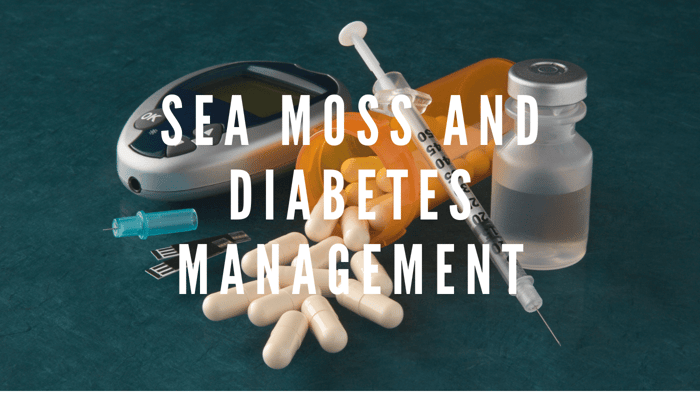Diabetes is a chronic disease that affects millions of people worldwide. It occurs when the body is unable to produce or properly use insulin, a hormone that regulates blood sugar levels. If left unmanaged, diabetes can lead to serious complications such as kidney disease, nerve damage, and blindness. While traditional treatments such as medication and insulin therapy are effective, many people are looking for natural alternatives to manage their blood sugar levels. One such natural remedy that has gained attention in recent years is sea moss.
What is Sea Moss?
Sea moss, also known as Irish moss, is a type of seaweed that is packed with essential nutrients and minerals, such as iodine, magnesium, and zinc. This fantastic super food can be found throughout the beautiful oceans of the Caribbean, Europe and North America. These minerals are known to be beneficial for people with diabetes as they play a vital role in regulating blood sugar levels and supporting overall health. Incorporating sea moss into a diabetes management plan can provide a natural and healthy way to boost mineral levels and improve blood sugar control. It can be consumed in various forms, including sea moss gel, capsules, and dried sea moss, and can be easily added to meals or drinks.
How Does Sea Moss Affect Blood Sugar Levels?
Sea moss is believed to have a beneficial effect on blood sugar levels. Studies have shown that it may help regulate glucose metabolism, which is the process by which the body converts glucose into energy. One study published in the journal Phytomedicine found that sea moss may have a hypoglycemic effect, meaning it can lower blood sugar levels in people with diabetes.
Sea moss contains a type of soluble fiber called carrageenan, which has been shown to slow down the absorption of glucose in the bloodstream. This can help prevent spikes in blood sugar levels and reduce the risk of complications associated with diabetes.
In addition to its fiber content, sea moss is also high in antioxidants such as flavonoids and carotenoids. These compounds have been shown to have anti-inflammatory properties and may help protect against oxidative stress, a condition in which there is an imbalance between free radicals and antioxidants in the body.
Sea Moss and Diabetes Management
While sea moss may have a beneficial effect on blood sugar levels, it is important to note that it is not a substitute for traditional diabetes management. People with diabetes should continue to follow their doctor's recommendations for managing their blood sugar levels, including monitoring their glucose levels regularly, taking medication as prescribed, and making lifestyle changes such as eating a healthy diet and exercising regularly.
That being said, sea moss may be a useful addition to a diabetes management plan. It is a natural and nutrient-dense food that can help support overall health and well-being. Incorporating sea moss into the diet may also help promote healthy digestion, which is important for people with diabetes who may be at a higher risk of developing digestive issues such as gastroparesis.
Understanding Zinc and its Importance in Diabetes Management
Zinc is an essential mineral that plays a key role in many bodily processes, including immune function, wound healing, and DNA synthesis. There is also evidence that zinc may be involved in the regulation of blood sugar levels. Studies have shown that people with diabetes may have lower levels of zinc in their bodies than those without the condition. Sea moss is a rich source of zinc, with one serving providing up to 20% of the recommended daily intake. Incorporating sea moss into a diabetes management plan could be beneficial in boosting zinc levels, which may help improve blood sugar control.
Iodine and Diabetes: How Sea Moss Can Help
Iodine is another important mineral that is essential for proper thyroid function and hormone production. Studies have shown that people with diabetes may have lower levels of iodine in their bodies than those without the condition. Sea moss is a rich source of iodine, with one serving providing up to 50% of the recommended daily intake. Incorporating sea moss into a diabetes management plan could be beneficial in boosting iodine levels, which may help improve thyroid function and blood sugar control.
The Role of Magnesium in Insulin Sensitivity and Diabetes Control
Magnesium is a mineral that is essential for many bodily processes, including muscle and nerve function, bone health, and regulation of blood sugar levels. Studies have shown that people with diabetes may have lower levels of magnesium in their bodies than those without the condition, and that low magnesium levels may contribute to insulin resistance. Sea moss is a good source of magnesium, with one serving providing up to 20% of the recommended daily intake. Incorporating sea moss into a diabetes management plan could be beneficial in boosting magnesium levels, which may help improve insulin sensitivity and blood sugar control.
Is Sea Moss And Bladderwrack Good For Diabetes?
Sea moss and bladderwrack are two types of seaweed that are often used together as a natural remedy for various health conditions, including diabetes. Bladderwrack is known for its high iodine content, which is essential for proper thyroid function and hormone production. Sea moss is a rich source of minerals such as zinc, magnesium, and calcium, which are also important for overall health and blood sugar control. Combining these two superfoods may provide a synergistic effect that can help improve diabetes management by supporting proper thyroid function, boosting mineral levels, and regulating blood sugar levels. However, it is important to consult with a healthcare professional before incorporating sea moss and bladderwrack into a diabetes management plan.
How to Use Sea Moss for Diabetes
Sea moss can be consumed in a variety of forms, including as a gel, capsule, or powder. The gel is the most popular form and can be easily added to smoothies, soups, and other recipes. Sea moss capsules are also available and can be taken as a dietary supplement.
When using sea moss for diabetes management, it is important to talk to your doctor first. They can advise you on the appropriate dosage and frequency of use based on your individual needs and medical history.
Conclusion
Sea moss is a nutrient-dense superfood that has gained popularity in recent years due to its numerous health benefits, including its potential to help regulate blood sugar levels in people with diabetes. While sea moss is not a substitute for traditional diabetes management, it may be a useful addition to a diabetes management plan. It is a natural and nutrient-rich food that can help support overall health and well-being. As with any dietary supplement, it is important to talk to your doctor before using sea moss for diabetes
 is here! Shop now, pay later in 4 easy installments
is here! Shop now, pay later in 4 easy installments



